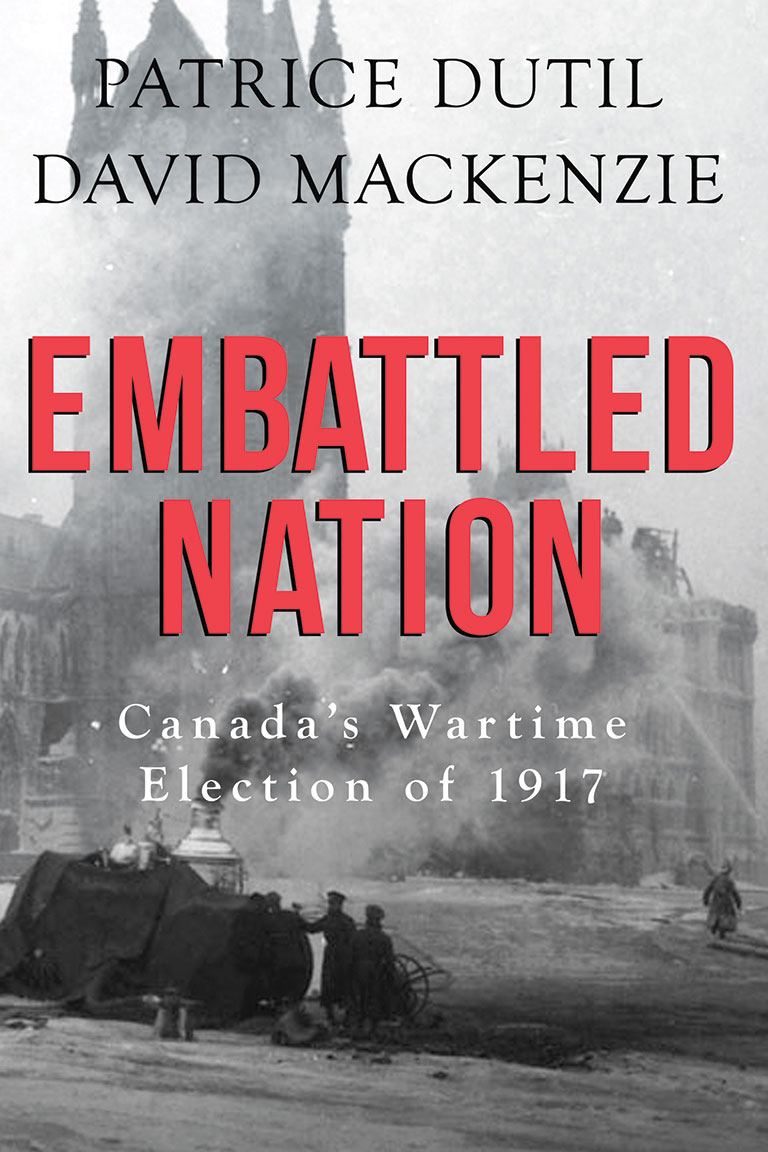Embattled Nation

Embattled Nation: Canada’s Wartime Election of 1917
by Patrice Dutil and David MacKenzie
Dundurn, 360 pages, $29.99
Misery loves company, so it’s good to be reminded that things used to be worse. The authors of this exhaustive and engaging new volume chose 1917 as the absolute rock bottom in Canadian history. Tens of thousands of Canadians were killed and wounded overseas, Halifax was devastated by the great explosion, and, in the intensely fought and deeply divisive election of that year, the authors write, the country itself “was almost lost by politicians blinded by ambition, lacking in imagination, and often paralyzed by incompetence and dithering.” And that broadside comes even before the preface is over.
Dutil and MacKenzie, both from Ryerson University, sustain this level of unsparing criticism throughout, but their judgments never seem unwarranted or anachronistic. On the contrary, over the course of several chapters they take pains to situate the political failings of Prime Minister Robert Borden and aging Opposition leader Wilfrid Laurier in the context of the era’s complex questions of language, national identity, and war.
Embattled Nation might be considered a sequel of sorts to the authors’ earlier Canada 1911, which examined the momentous Borden-Laurier election of that year. The authors carefully revisit and untangle some of the themes of their earlier book, examining the complex interplay of nationalism and imperialism that continues to befuddle students today. For example, the schools question — the issue of whether or not Catholic and French education would be offered in provincial schools outside Quebec — is a topic dreaded by students and lecturers alike.
Here, however, Dutil and MacKenzie demonstrate that the schools question embodied the whole debate over whether or not Canadians could have a shared conception of nationhood. This question resonated powerfully at a time when national unity was called upon. Ontario’s Resolution 17, which restricted French education in the province, became a particular source of animus. French-Canadian opponents of the war, including the eloquent but increasingly strident Henri Bourassa, seized upon the resolution as an exemplar of what they characterized as the hypocrisy of the war effort. “Everything is being done to hide the supreme danger that our nationality could be annihilated by British imperialism,” Bourassa proclaimed in one speech.
These pre-existing social tensions came to a head as the scale of Canada’s war effort vastly exceeded initial expectations. Borden returned from his early 1917 trip overseas convinced that conscription could not be avoided, and it is hard to escape the conclusion that he was correct. But the authors argue that this in no way justifies what followed in the 1917 election, which, they say, was “fought on the issue of conscription, but decided on the basis of identity.”
Borden and Laurier entirely failed to resolve or even to adequately address the divisive questions of identity. Far from the noble statesman, Laurier comes across here as exhausted, dithering, and even cowardly, subjected to incessant attacks across the entire political spectrum. Meanwhile, Borden, ignorant of French Canada and politically hamfisted, was so convinced of the necessity of conscription that he adopted plainly corrupt means to secure victory in the December election. “Never has a government so failed its people,” the authors conclude.
Recently, historian Patrick Dennis has argued persuasively that those who were conscripted under the Military Service Act, while comparatively few in number, played a critical role in shoring up the strength of Canadian infantry units during the decisive Hundred Days campaign of August to November, 1918. But the authors wisely avoid arguing about whether or not the ends justified the means.
They might, however, have given a nod to some of the recent demographic work on the Canadian Expeditionary Force that has challenged the assumption of low enlistment in the CEF by French Canadians. The authors seem to take at face value contemporaneous assessments; but, as Jonathan Vance and others have argued, many young Quebecers enlisted outside the province, creating a false impression that French Canadians as a whole were inordinately opposed to military service.
Was 1917 really the worst year in Canadian history? Maybe. A very good case could be made for 1918, too; but the election of 1917 and the Military Service Act set the stage for the following dramas. Moreover, the issue of conscription, the authors conclude, rent the national fabric for decades to come, even sowing the seeds of the separatist movement.
Dutil and MacKenzie are top-tier scholars who have written a bracing narrative that will be admired by academics and general readers alike. I hope they appreciate that I now have to rewrite my lecture on the election of 1917. Or maybe instead I’ll just assign Embattled Nation, a very good book about a terrible, terrible year.
Themes associated with this article
Advertisement
You might also like...

Our online store carries a variety of popular gifts for the history lover or Canadiana enthusiast in your life, including silk ties, dress socks, warm mitts and more!









